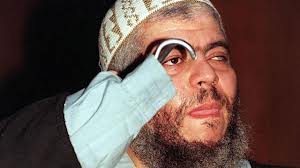 A radical Muslim cleric whose fiery sermons at a London mosque were blamed for influencing followers to embrace a holy war against the United States arrived in New York on Saturday along with other terrorism suspects after losing a battle to fight extradition from Britain.
A radical Muslim cleric whose fiery sermons at a London mosque were blamed for influencing followers to embrace a holy war against the United States arrived in New York on Saturday along with other terrorism suspects after losing a battle to fight extradition from Britain.
Abu Hamza Masri, also known as Mustafa Kamel Mustafa; Adel Abdel Bary; and Khaled Fawwaz appeared in federal court in Manhattan hours after their arrival in the U.S. to face multiple terrorism-related charges. Two other suspects were sent to Connecticut.
The overnight trip to the United States ended a long-running extradition battle that ended Friday, when Britain’s high court rejected Masri’s final legal bid and ruled could be sent to the U.S. immediately.
The charges against Masri, the best-known of the five, include orchestrating the 1998 kidnapping of a group of tourists in Yemen, which left four hostages dead; conspiracy to help set up a terrorist training camp in Oregon in 1999 and 2000; and providing material and other support to anti-U.S. jihadists in Afghanistan and Pakistan.
Masri appeared for less than 15 minutes in front of a federal court judge and entered no plea, saying only “I do” when asked whether the financial affidavit used to determine whether he qualified for a court-appointed lawyer was correct, the Associated Press reported.
His court-appointed attorney asked that her client, who claims to have lost his hands fighting the Soviets in Afghanistan, have his prosthetics immediately returned. She also asked for a dictation machine, saying Masri couldn’t take notes; the return of his diabetes medication; and special shoes that prevent him from slipping. She said he would need a special diet and a full medical evaluation in prison, according to the Associated Press.
An indictment says Masri, an Egyptian-born citizen of Britain, used funds collected at a Finsbury Park mosque in north London, where he preached, to pay for travel expenses for him and alleged co-conspirators to meet with terrorists and oversee training operations.
Prosecutors say that among other things, Masri gave thousands of dollars to an associate in 2001 to set up a computer lab in Afghanistan that would “service Taliban officials” and be controlled by the group and Al Qaeda leader Osama bin Laden, who was killed by U.S. forces in May 2011.
In all, Masri is charged with 11 terrorism-related counts, two of which — conspiracy to take hostages and hostage-taking — carry possible life sentences.
In Manhattan, U.S. Atty. Preet Bharara said the extradition was a “watershed moment.”
“These are men who were at the nerve centers of Al Qaeda’s acts of terror,” he said.
For years, Masri found a pulpit at the Finsbury Park mosque, where his anti-Western railings were blamed for prompting the so-called shoe bomber, Richard Reid, to hide explosives in his sneakers and try to bring down an American Airlines jet in 2001. British authorities arrested him in 2004 on charges of inciting racial hatred and soliciting the murder of non-Muslims. That prompted the U.S. effort to extradite him to face additional charges on American soil.
Fawwaz, 50, a Saudi citizen, is accused, among other things, of working with Bin Laden in 1994 to set up a media office in London to publicize the Al Qaeda leader’s statements and to act as a cover for funneling money, messages and equipment to Al Qaeda cells worldwide. He is also accused of having issued a “declaration of Jihad against Americans” on behalf of Bin Laden while in London.
Bary, a 52-year-old Egyptian, is accused of acting as chief of the London cell of Egyptian Islamic Jihad, a position he purportedly was given by its then-leader, Ayman Zawahiri. Zawahiri became Al Qaeda’s chief after U.S. forces killed Bin Laden.
In addition to being charged with conspiring with Al Qaeda, Bary is charged with murder, use of weapons of mass destruction, and other terrorism-related offenses in connection with the 1998 bombings of the U.S. embassies in Kenya and Tanzania. The attacks killed 224 people.
Fawwaz faces four terrorism-related charges, including conspiracy to murder and conspiracy to kill U.S. nationals. All of them carry possible life sentences. Bary is charged with 284 offenses, including the murder counts stemming from the embassy attacks.
Both men pleaded not guilty, according to the Associated Press. An attorney for Fawwaz told the court he was concerned about whether his client would be properly treated for hypertension. Bary’s attorney said his client needed asthma medication and treatment for other medical problems.
Two other terrorism suspects, Babar Ahmad and Syed Talha Ahsan, also were extradited overnight from Britain and appeared in court in New Haven, Conn., where a grand jury indicted them on charges of supporting terrorism activities.
Ahsan, 33, and Ahmad, 38, entered not-guilty pleas to charges that they provided terrorists in Afghanistan and Chechnya with cash, recruits and equipment, according to the Associated Press. Their lawyers declined to comment.
Photo: Abu Hamza Masri, who has one eye and hooks in place of hands he claims to have lost fighting the Soviets in Afghanistan, said he suffers from depression, chronic sleep deprivation, diabetes and other ailments. He is expected to face multiple terrorism-related charges in the US

Leave a Reply
You must be logged in to post a comment.